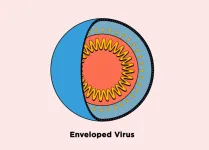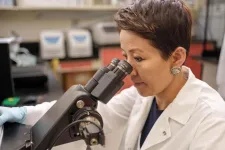(Press-News.org) Breast cancer survival rates have improved considerably in the last few decades in Colombia, but factors that increase the likelihood of patients experiencing cardiovascular side effects, like cardiotoxicity, are not well-known or well-treated. A recent study in the North-East region of Colombia found 11.94% of patients with a high BMI being treated for breast cancer at a regional center experienced heart damage, or cardiotoxicity, during chemotherapy. The study will be presented at the American College of Cardiology (ACC) Latin America 2023 Together with Asociación Costarricense de Cardiología in San Jose, Costa Rica.
“Cardiotoxicity is a relatively recent concern in cancer care, and its recognition as a significant issue is still evolving. In regions with limited research infrastructure and resources, there may be a lack of specific studies or initiatives addressing cardiotoxicity in the context of breast cancer treatment,” said the study’s lead author Ivetteh Gaibor Santos, MD, an internal medicine specialist at Universidad Autónoma de Bucaramanga/Fundación Oftalmológica de Santander-Foscal in Bucaramanga, Colombia, and a cardiology fellow-in-training at Fundación Universitaria de Ciencias de la Salud/Hospital de San José in Bogotá, Colombia.
An anonymized database of breast cancer patients who started chemotherapy with doxorubicin or trastuzumab between January and December 2021 was used for the study. The analysis only included patients who had a baseline echocardiogram and at least one follow-up echocardiogram. The database also recorded sociodemographic, oncological, cardiovascular and echocardiographic variables.
Cardiotoxicity was defined as a decrease in left ventricular ejection fraction (LVEF) of more than 10% reaching a value below 50% or a relative reduction of more than 15% in global longitudinal strain in patients with a normal LVEF. Ejection fraction is the amount of blood the heart pumps out each time it beats. A normal ejections fraction is 50% or higher.
The study cohort included 67 patients, with an average age of 55 years old and mean body mass index (BMI) of 26.18 kg/m². BMI is derived from the mass and height of a person. Baseline characteristics of the study cohort included obesity (20.9%), hypertension (14.93%) and Type 2 diabetes (13.43%). All of the patients had a normal LVEF before starting chemotherapy.
Results found the prevalence of cardiotoxicity was 11.94%. A body mass index of 25 and above (overweight/obesity) was the only predisposing risk factor for developing this adverse effect.
“Obesity is itself a risk factor for the development of breast cancer and cardiovascular disease like heart failure but it isn´t often properly managed, unlike other prevalent risk factors like high blood pressure,” said Gaibor Santos, who added that all patients in this study were taking antihypertensive drugs. Chemotherapeutic agents, which are formulated according to body surface area instead of body composition, may lead to further risk of cardiotoxicity in patients with obesity due to over- or under-dosing, she said.
According to the study authors, early diagnosis of cardiotoxicity and related factors is vital to allow treating clinicians to reduce adverse outcomes.
To raise awareness about the risks of cardiotoxicity in cancer treatment among health care professionals and the general population, the researchers suggest several actions, including:
Enhanced medical education on cardiotoxicity in both medical schools and continuing medical education
Multidisciplinary collaboration among specialties to improve the understanding of cardiotoxicity among clinicians and patients and facilitate early detection and intervention
Encourage and support research initiatives focused on cardiotoxicity in cancer treatment
Use of digital resources to provide clinicians with easy access to up-to-date information on cardiotoxicity
“Addressing obesity in cancer patients before starting chemotherapy as well as considering the potential risk for cardiotoxicity requires a comprehensive approach,” Gaibor Santos said. “Some strategies clinicians can consider include pre-treatment assessment, lifestyle interventions and cardiovascular risk management. It is important to note that these strategies should be tailored to each patient’s specific needs and in accordance with current evidence-based guidelines.”
“I am convinced that this is the first of many investigations that will come in the future regarding cardio-oncology in Colombia, and I am thrilled to continue working on this field because I know there are so many patients that could be benefited from the results of our upcoming studies,” Gaibor Santos said.
Learn more about ACC Latin America 2023 Together with Asociación Costarricense de Cardiología at ACC.org/LatinAmerica2023. To receive media credentials, please reach out to Katie Glenn with the ACC Press Office at kglenn@acc.org.
American College of Cardiology (ACC) is the global leader in transforming cardiovascular care and improving heart health for all. As the preeminent source of professional medical education for the entire cardiovascular care team since 1949, ACC credentials cardiovascular professionals in over 140 countries who meet stringent qualifications and leads in the formation of health policy, standards and guidelines. Through its world-renowned family of JACC Journals, NCDR registries, ACC Accreditation Services, global network of Member Sections, CardioSmart patient resources and more, the College is committed to ensuring a world where science, knowledge and innovation optimize patient care and outcomes. Learn more at www.ACC.org or follow @ACCinTouch.
###
END
AUSTIN, Texas – A new statistical tool can help researchers get meaningful results when a randomized experiment, considered the gold standard, is not possible.
Randomized experiments split participants into groups by chance, with one undergoing an intervention and the other not. But in real-world situations, they can’t always be done. Companies might not want to use the method, or such experiments might be against the law.
Developed by a researcher at The University of Texas at Austin, the new tool called two-step synthetic control adapts an existing research workaround, known as the synthetic control method.
The ...
The first-ever study to look at drivers of both marine heatwaves and cold spells in the shallow nearshore along the California Current —coordinated by California Polytechnic State University, San Luis Obispo (Cal Poly) and the Virginia Institute of Marine Science, William & Mary — found that certain environmental conditions and the state of the ocean can lead to an enhanced risk for ocean temperature extremes.
The findings were recently published in Nature Scientific Reports in an article titled “Effects of basin-scale climate modes and upwelling on nearshore marine heatwaves and cold spells in the California Current.”
Extreme ...
Just as bacteria can develop antibiotic resistance, viruses can also evade drug treatments. Developing therapies against these microbes is difficult because viruses often mutate or hide themselves within cells. But by mimicking the way the immune system naturally deals with invaders, researchers reporting in ACS Infectious Diseases have developed a “peptoid” antiviral therapy that effectively inactivates three viruses in lab tests. The approach disrupts the microbes by targeting certain ...
Antiviral therapies are notoriously difficult to develop, as viruses can quickly mutate to become resistant to drugs. But what if a new generation of antivirals ignores the fast-mutating proteins on the surface of viruses and instead disrupts their protective layers?
“We found an Achilles heel of many viruses: their bubble-like membranes. Exploiting this vulnerability and disrupting the membrane is a promising mechanism of action for developing new antivirals,” said Kent Kirshenbaum, professor of chemistry at NYU and the study’s senior author.
In a new study ...
DALLAS, August 2, 2023 — The American Heart Association, a relentless force for a world of longer, healthier lives, has recognized 2,671 health care and emergency response organizations — nearly 145 more than in 2022 — for their commitment to improving health outcomes for cardiovascular patients through evidence-based efficient and coordinated care.
The American Heart Association’s Get With The Guidelines® and Mission: Lifeline® are hospital-based quality improvement recognition programs that use the latest evidence-based scientific guidelines to save lives and hasten health care recovery ...
With a survival rate in the single digits, pancreatic ductal adenocarcinoma (PDAC) is highly lethal. In fact, by the time PDAC is clinically diagnosed, it is already considered incurable via surgery or other means in up to 90% of patients.
Yangzom D. Bhutia, D.V.M., Ph.D., from the Department of Cell Biology and Biochemistry at the Texas Tech University Health Sciences Center (TTUHSC) School of Medicine, has for years focused her research on PDAC. To bolster her efforts, the National Cancer Institute at the National Institutes of Health recently awarded Bhutia a five-year, $1.76 million grant (“SLC6A14 as a unique ...
A sociological study by the University of Zurich confirms that a considerable proportion of employees perceive their work as socially useless. Employees in financial, sales and management occupations are more likely to conclude that their jobs are of little use to society.
In recent years, research showed that many professionals consider their work to be socially useless. Various explanations have been proposed for the phenomenon. The much-discussed “bullshit jobs theory” by the American anthropologist David Graeber, for example, states that some jobs are objectively useless and that this occurs more frequently ...
SPOKANE, Wash. – One year after the Dobbs decision, 41.8% of U.S. women of reproductive age have to drive 30 minutes or more to reach an abortion care facility, according to a study of data as of June 2, 2023. Researchers predicted that number would rise to 53.5% if other state bills under consideration are passed.
The study estimated longer drives as well, finding that 29.3% of women didn’t have access to a facility within a 60-minute drive and 23.6% lacked access even within a 90-minute drive. Those figures would jump to 45.6% ...
Adverse childhood experiences have impacts deep into old age, especially for those who experienced violence, and include both physical and cognitive impairments.
It’s known that a difficult childhood can lead to a host of health issues as a young or midlife adult, but now, for the first time, researchers at UC San Franciso have linked adverse experiences early in life to lifelong health consequences.
They found that older U.S. adults with a history of stressful or traumatic experiences as children were more likely to experience both physical and cognitive impairments in their senior years. Stressful childhood experiences could include exposure to ...
EL PASO, Texas (Aug. 2, 2023) – Which types of personalities were more hesitant about COVID-19 vaccination during the pandemic’s peak? Extroverts — according to a new study on more than 40,000 Canadians.
“We expected that people who were especially high in extroversion would be more likely to get the vaccine,” said Melissa Baker, Ph.D., lead author and assistant professor at The University of Texas at El Paso. “We figured those people would want to get back out in the world and socialize, right? It’s actually the opposite.”
The findings, ...



